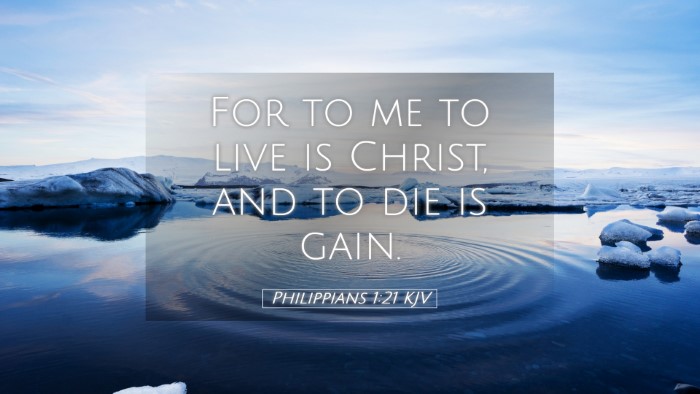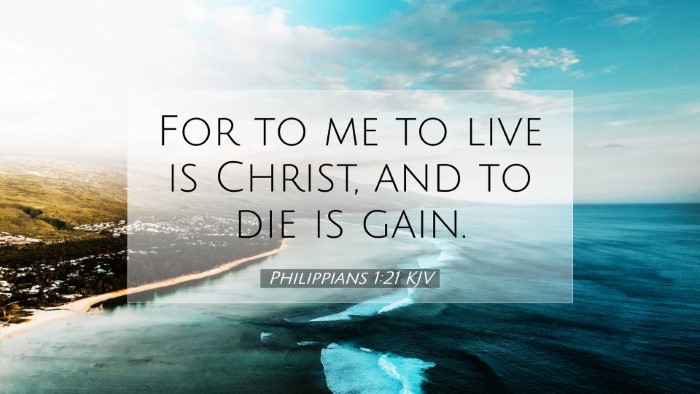Commentary on Philippians 1:21
Text of the Verse: "For to me, to live is Christ and to die is gain."
Introduction
This profound declaration by the Apostle Paul encapsulates the essence of Christian living and the believer's relationship with life and death. Paul articulates the duality of existence: living for Christ and the implications of death. Various public domain commentaries provide insights into the theological significance and practical implications of this verse.
The Meaning of Life in Christ
Matthew Henry emphasizes that Paul's life was entirely devoted to Christ. He draws attention to the idea that living true to the gospel means embodying Christ-like virtues, impacting others through service, and spreading the message of salvation.
- Service to Others: Living for Christ means engaging in acts of compassion and service, reflecting Christ’s love to the world.
- Spiritual Growth: The believer's life should be characterized by continuous growth in holiness, understanding, and obedience to God's Word.
- Witness to the World: Our daily lives should be testimonies of Christ’s transformative power, drawing others to Him.
The Implications of Death
Albert Barnes discusses the notion of death as 'gain'. He interprets this as a departure from the struggles and tribulations of this life into the glorious presence of God. For believers, death is not an end, but a transition into a fuller experience of life with Christ.
- Hope in Resurrection: Barnes notes that Christian hope lies in the resurrection promised by Christ, assuring believers of eternal life.
- Rest from Labors: Death for the believer signifies rest from the burdens and conflicts of earthly existence.
- Rewards Await: The concept of ‘gain’ also encompasses the rewards that believers will receive for their faithful stewardship while on earth.
The Dual Perspective of Life and Death
Adam Clarke highlights the contrast Paul presents between living and dying. He stipulates that true life reflects a surrender to Christ, where every action, thought, and goal is centered on Him. Conversely, to die signifies liberation and the ultimate realization of one’s hope in Christ.
- Surrendered Living: Clarke asserts that acknowledging Christ as the foundation of life leads to a sense of purpose and direction.
- Death as Liberation: He marvels at the believer's assurance that death is not feared but welcomed as an entrance into eternal glory.
- A Call to Live Boldly: This dual perspective calls Christians to live differently — with boldness and urgency, knowing their ultimate destination.
Theological Applications
Philippians 1:21 serves as a focal point for various theological reflections, both for personal edification and pastoral teaching. The implications of this verse can be summarized in the following key applications:
- Christ-Centered Living: The church is encouraged to foster a Christ-centered lifestyle that emphasizes devotion, obedience, and a commitment to the Great Commission.
- Understanding Suffering: In the context of Paul’s imprisonment, the verse invites reflection on how suffering is reasonable when viewed through the lens of Christ’s own suffering for humanity.
- Death and Assurance: Pastoral teachings can draw from this verse to comfort believers facing mortality by instilling hope in the promise of eternal life.
Conclusion
Philippians 1:21 invites deep contemplation and application of what it means to live a life that glorifies Christ while embracing the hope that comes from knowing death leads to gain. The insights provided by Matthew Henry, Albert Barnes, and Adam Clarke encourage believers to view life as an opportunity for ministry and to face death with confidence, knowing it transitions them to a loving and eternal relationship with God.


